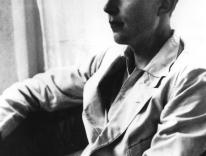That is certainly my sense of Benedict's address at the Vatican this morning to U.S. Jewish leaders. The meeting was the latest and probably last high-profile effort to soothe Jewish-Catholic relations in the wake of the pontiff's outreach to the schismatic Traditionalists of the SSPX, including the Holocaust-denying bishop, Richard Williamson.The text is here, the CNS write up is here, and at America's blog, Michael Sean Winters found the speech note-perfect. "As is often the case, the Holy Father played an entire symphony of right notes," Winters writes.Jewish leaders seemed pleased, though the whole process seemed somewhat scripted. And the continuing demands of some that the Pope hold the SSPXers' feet to the fire on accepting Vatican II is prompting increasingly vocal resentment among some Catholics. ("It's OUR church--butt out!")As with previous papal encounters with Jewish groups, I found Benedict's remarks flat-footed and unremarkable--certainly not resonant of a German Catholic who experienced the Nazi era first-hand, witnessed the deportation of Jews from his own town, grew up within miles of Dachau and labor camps, and saw the anti-Semitism of many in his own church--an anti-Semitism which is chillingly reminiscent of the cant spouted in the SSPX.The pope spoke in general terms again about the Holocaust, but without descending into the nitty gritty of historical detail that could be a real catharsis. "How can we begin to grasp the enormity of what took place in those infamous prisons?" he said. "The entire human race feels deep shame at the savage brutality shown to your people at that time." Yes, but the Catholic Church has a special shame, a specific responsibility.The closest the pope came to that was when he cited a prayer written by John Paul II, saying he now took those words as his own. I'd like to hear his own words. He of course reiterated Vatican statements of recent days rejecting Holocaust denial absolutely, etc. Benedict appears to want to move on: "The two-thousand-year history of the relationship between Judaism and the Church has passed through many different phases, some of them painful to recall. Now that we are able to meet in a spirit of reconciliation, we must not allow past difficulties to hold us back from extending to one another the hand of friendship. Indeed, what family is there that has not been troubled by tensions of one kind or another?"To me it was a lost opportunity. He will have another, as he confirmed that he will be visiting Israel in May. What an opportunity that will be. We live in hope.Other thoughts?


